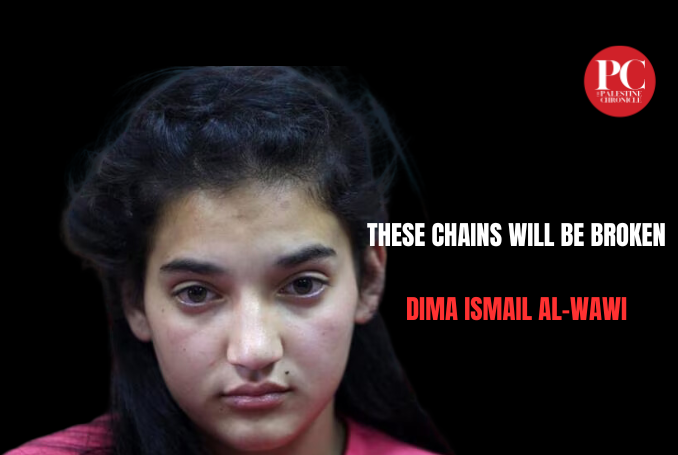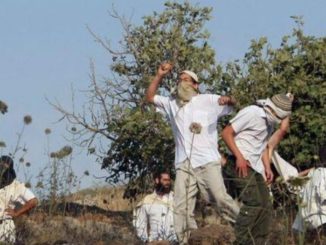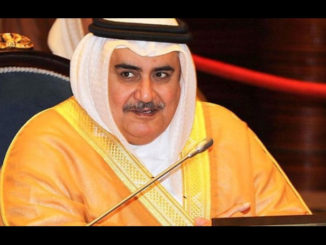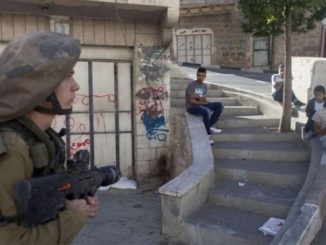
Starting on Friday, November 24, a prisoner swap between the Palestinian resistance and Israel began in stages. On Friday, 39 Palestinian prisoners were released. More prisoners were freed on Saturday.
To provide some context, The Palestine Chronicle will publish stories of Palestinian prisoners included in Ramzy Baroud’s volume ‘These Chains Will Be Broken: Palestinian Stories of Struggle and Defiance in Israeli Prisons’. (Clarity Press.)
The text below appeared in a chapter entitled “The Girl Who Did Nothing”.
Dima Ismail Rashid al-Wawi was born on November 20, 2003 in the town of Halhul, north of Al-Khalil (Hebron) in the occupied West Bank. She is the youngest of six sisters and three brothers. Her family earns its income mostly from farming a small piece of land located on the outskirts of the town.
Halhul has been a constant target for Israeli army raids, as its residents have protested against the confiscation of much of their land to support the expansion of the illegal Jewish settlement of Karmei Tzur. Since 2000, the Israeli military has confiscated about 1,500 dunums of land belonging to Halhul, which is subject to routine closures imposed by the Israeli army.
Halhul is almost entirely suffocated. While the illegal settlement blocks the residents’ movement north, an Israeli military base and ‘Jewish-only’ by-pass roads isolate the town from all other directions. With military checkpoints and iron gates, the residents of Halhul are trapped and isolated from their natural surroundings.
Dima has been witness to much of the violence and injustice meted out against her town, although her family tried to protect her and her siblings. On February 9, 2016, Dima was ‘arrested’ by an armed, illegal Jewish settler who claimed that the 12-year-old girl was trying to stab him. After weeks of interrogation by the Israeli army, a military court sentenced her to four and a half months in prison.
Throughout her interrogation, Dima kept telling Israeli officers: ‘Ma’miltish ish’, ‘I didn’t do anything.’
The Girl Who Did Nothing
I had a terrible headache. I did not know what to do. One of my sisters said: ’Mom is working in the field; go and see if she will take you to the clinic.’ I did not know exactly where our land was. We rarely went there; only Mom, Dad and my older siblings did. The younger kids, like me, stayed home, because the Jewish settlers always harassed my family and my parents wanted us to be safe. All I knew is that our land was located near the Jewish settlement. I thought if I reached the settlement first, I could easily find my mom.
Our piece of land is small. It used to be bigger, but the Jewish settlement kept growing in size and kept eating at the land around it, land that belonged not only to Halhul, but to Beit Ummar as well.
When I got close to the settlement, I could not find my mom or any of my family. I was desperate. I started walking hurriedly, at times even running, while looking everywhere. Suddenly an armed man charged at me. He pushed me to the ground and pointed a gun at me. He then ordered me to lie face down, stepped on my back and tied my hands together. After that, he blindfolded me. I was crying really hard, but no one could hear me. Later, a group of Israeli soldiers arrived and threw me into the back of an army vehicle.
I was only 12 years old when this happened. They accused me of trying to stab a settler. It is a complete lie. The settler made that up to justify the way he treated me. They placed me in a very dark room. It was the first time in my life that I slept away from my mom and my family. I was very scared. I thought to myself: ‘What if they keep me in prison my whole life?’ I felt so bad for my mom. She did not know where I was. She was running all over the area calling my name.
They transferred me to HaSharon Prison. There were screams and loud noises coming from everywhere. The Israeli officer who interrogated me told me that I would be imprisoned for a long time. It was so shocked to hear that. I never thought I would endure such an experience. I had heard of this happening to other kids, but I had no idea that it would happen to me, too. I did not know that the occupation was so criminal and so unfair to this extent. But I told myself: ‘Dima, you have to be strong and face your reality the way it is.’
Then, seven large officers entered the room and began interrogating me all at the same time. I was afraid. I kept repeating: ‘Ma’miltish ish’, ‘I didn’t do anything’. But they kept asking, swearing at me and yelling in my face, from morning until the evening hours. Before they left, they tied me to a chair that did not even have legs. I tried so hard to find a comfortable position. It was impossible. I stayed that way until after midnight.
Days passed without my being able to see my family. Only a long time later, my mom was allowed to see me. I was missing my dad, my brothers and my sisters, but just seeing my mother’s beautiful face made me happy. She held me close to her the whole time. Her embrace is always so warm. But, then, she had to leave. When she did, I felt that my soul and my heart left with her.
I was tried before a military court in the Ofer Prison. I kept telling them that all the accusations were a lie. However, the judge did not listen to me and sentenced me to four and a half months in prison. Back at HaSharon Prison, they placed me with a child around my age. Her name is Malik Salman. We were in the same prison with all the Israeli women criminals. Later, they moved us to the part of the prison where the Palestinian women were held.
I spent a lot of time talking to the prisoners. They were women who were recovering from wounds and others who were young, like me, although I was the youngest in prison at the time. There were mothers separated from their children, and children needing to be with their families. There was a woman named Israa’ Ja’abis. Her body was completely burned. I felt so sorry for her, although she was very strong. She looked after me.
One night, I could not sleep. I kept hearing what sounded like the voice of a man being tortured. He was screaming in pain and asking for God’s help. I barely slept for a few minutes before I had a terrible nightmare. I woke up screaming, fell off the bed and hurt my neck, which started to bleed. I was too scared to say anything, so I just kept my hand on my neck to stop the blood.
My mattress was very thin, and my pillow was too high. It was so hard to fall asleep, no matter how hard I tried. Everything around me was made of metal and everything was very cold. The food was terrible, and prison guards yelled at us constantly and treated us badly. They would come and order us to stand side by side for a count whenever they pleased. Those who were not available right away would be thrown into solitary confinement.
I served two and a half months of my sentence. The night I was released, an Israeli interrogator summoned me to a room and told me that I would be receiving a life term in prison. I collapsed and began crying, but then they released me the next day. I had no idea what was happening most of the time. In the courts, they spoke Hebrew. They yelled and swore at me all the time. All I knew was that I was in prison for something I did not do.
When I finally knew that I would be released, I tried to recall everything that had happened, to make sense of that terrifying experience. I counted the minutes, even the seconds, separating me from being with my family. At last, soldiers came, handcuffed and shackled me and took me to the bosta. But, instead of dropping me in Halhul, they left me at a military checkpoint in Tulkarm. They thought no one would care to greet me there, but hundreds of people turned out. They came from Halhul, Tulkarm and all over the West Bank. They all hugged me, kissed me, held me on their shoulders and chanted my name and for Palestinian freedom. When I finally got to see my family, I embraced my mom and dad at once. They kissed me all over. I was so happy to be free again, but I could not stop thinking of all the women who were still in prison. They had treated me as though they were all my mothers.
After I was released, on April 26, 2016, I returned to the Halhul Martyrs School. It was wonderful to be back, and I cannot wait to finish my education and become a journalist, carrying the message of the prisoners and their suffering to the world. I want to show the world how the children of Palestine are mistreated every day by the occupation.
Finally, I would like to send a simple message to the free peoples of this world. Please keep Palestine in your heart. Think of the children who are oppressed and who will continue to be oppressed until this unjust occupation ends.








